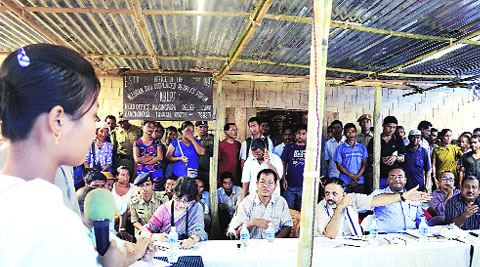
A Centre team visits Reang refugee camps in Kanchanpur on Tuesday. (Source: PTI)
Aizawl, Aug 27 : Residents of these camps are neither entitled to work under the MGNREGA nor are given farmland to earn a livelihood.
The seven-member committee, headed by Additional Union Home Secretary Rajiv Gauba, landed in Agartala on Monday. The panel was appointed on the orders of the Tripura High Court following a PIL which had complained about the “inhuman conditions” in the camps.
The relief camps are mostly populated by rehabilitated Bru tribals who fled to Mizoram in 1997 following ethnic conflict. According to the court order, of the 21,312 Internally Displaced Persons (IDPs) in these camps, each adult gets Rs 5 per day plus 600 grams of rice. Minors, meanwhile, get Rs 2.5 and 250 grams of rice. Each family is also given Rs 10 per month to purchase cooking oil.
Residents of these camps are neither entitled to work under the MGNREGA nor are given farmland to earn a livelihood. The court had also observed that they are not being issued birth or death certificates.
Calling the conditions “ridiculous”, the court had said, “Tripura expects that sooner or later these refugees will go back to their homeland. That may be true but we cannot lose sight of the fact that for the last 17 years this problem has not been resolved.” Bru leaders in the relief camps echo the HC’s view.
“Their (Tripura government’s) aim is to make life as hard for us as possible so we will have no choice but to go home to Mizoram,” said Bruno Masha, General Secretary of the Mizoram Bru Displaced People’s Forum (MBDPF). “In Tripura, tribals are a minority…The dominant community is Bengali.
They are scared of us staying here forever. So the non-tribals often tell us to go home,” he added.
Masha said the insufficient relief and the unavailability of employment has forced Brus in the camps to settle for any kind of work at low wages. “At times, we settle for Rs 100 for work a local can earn Rs 200 for,” he says.







0 comments:
Post a Comment